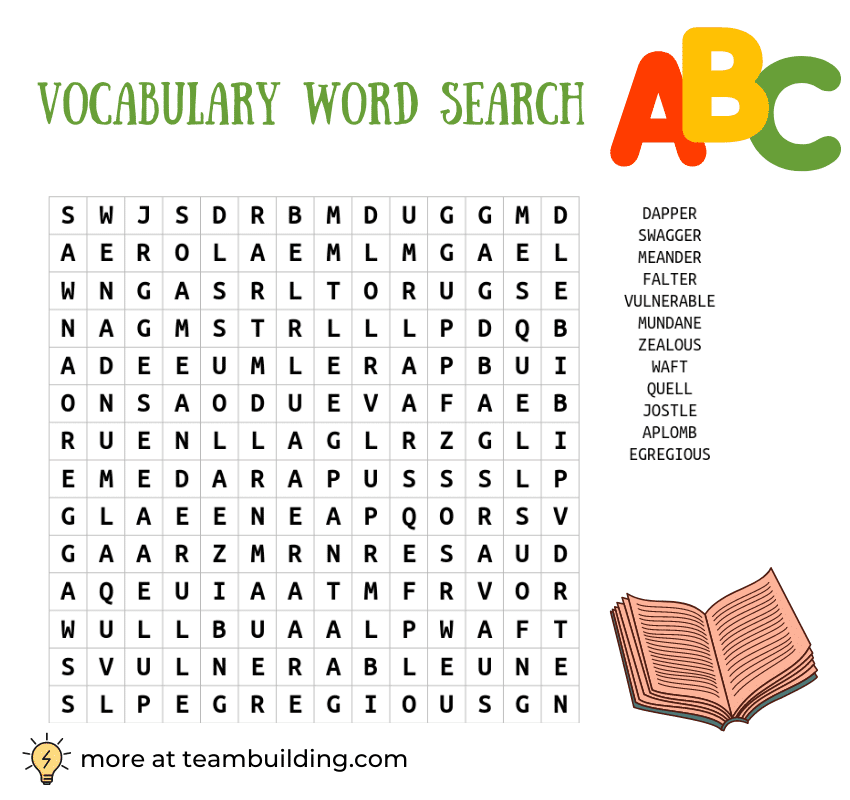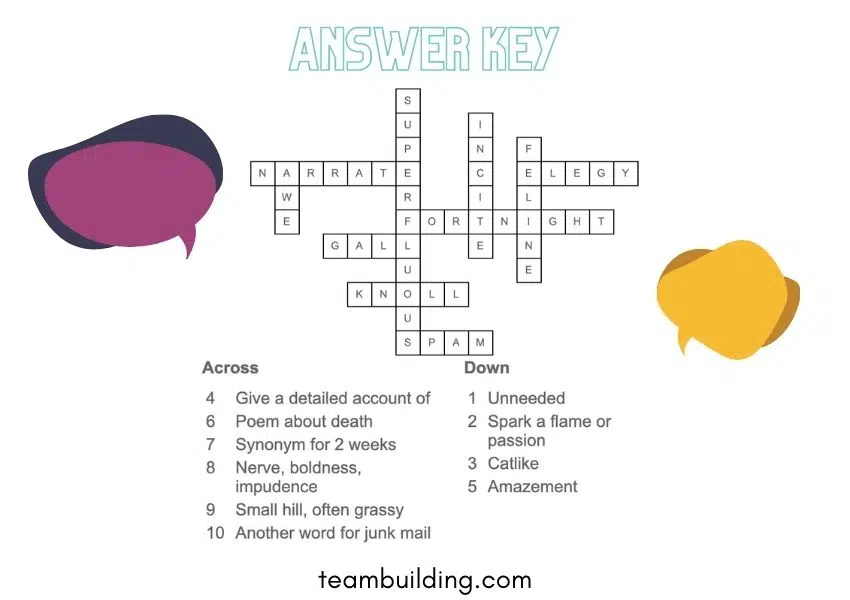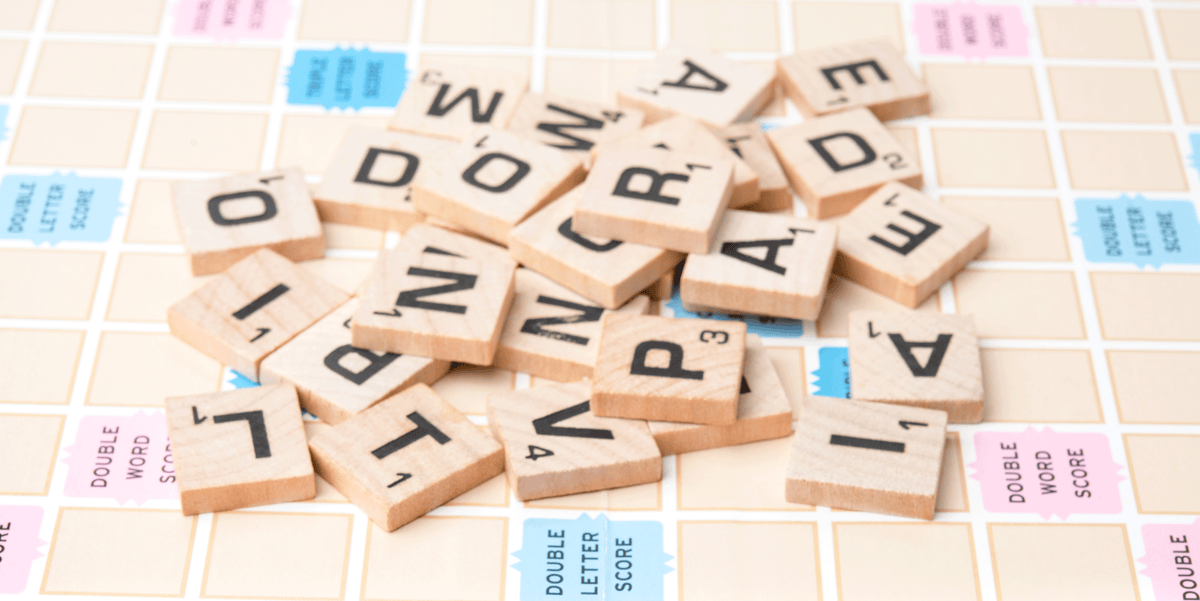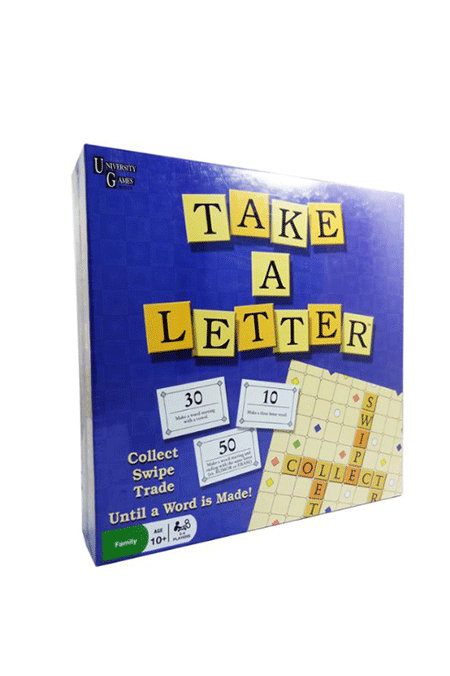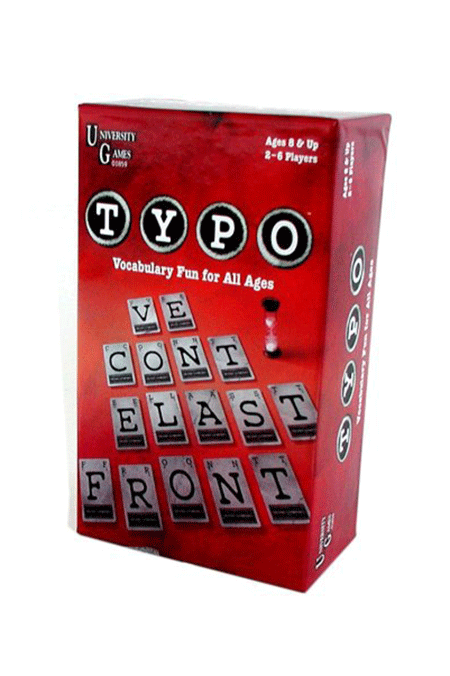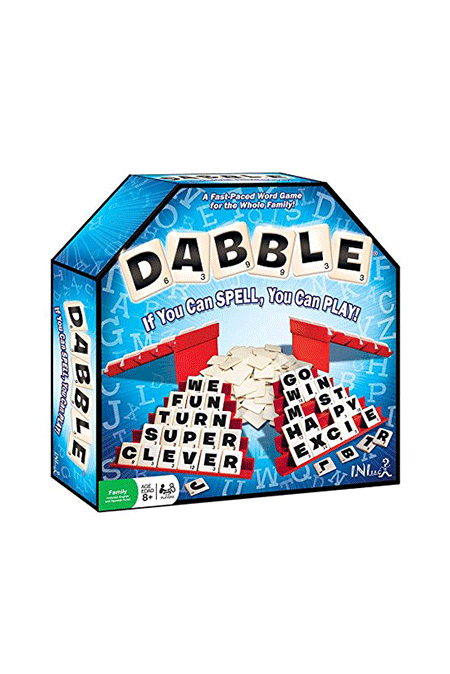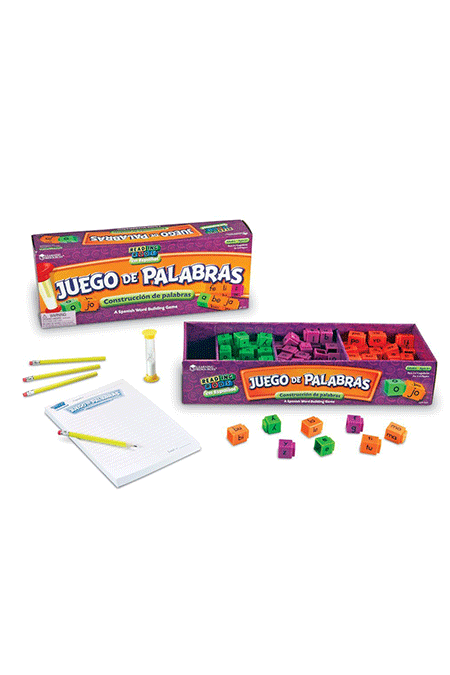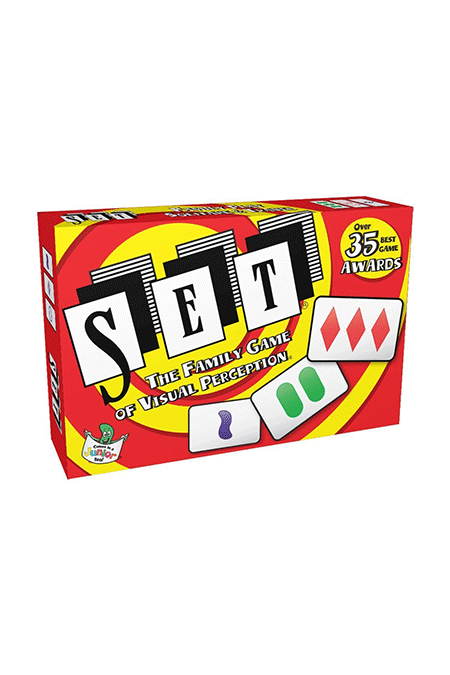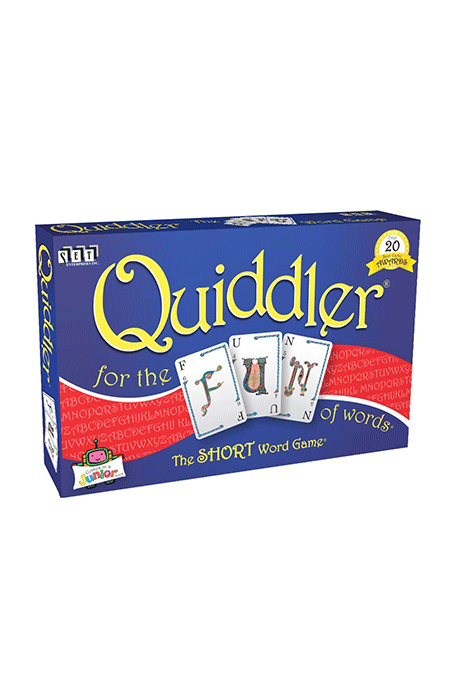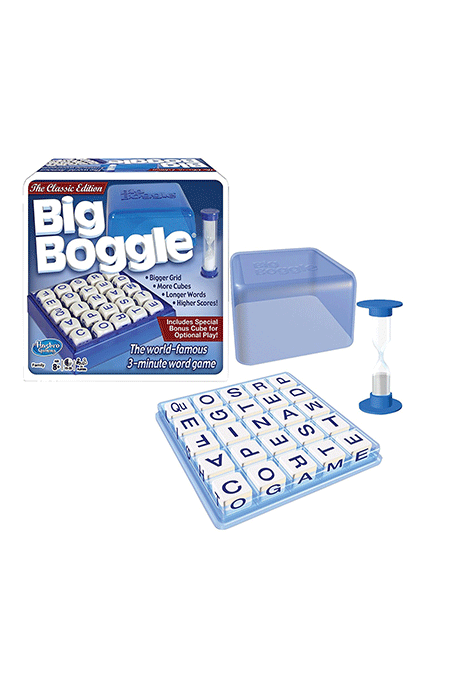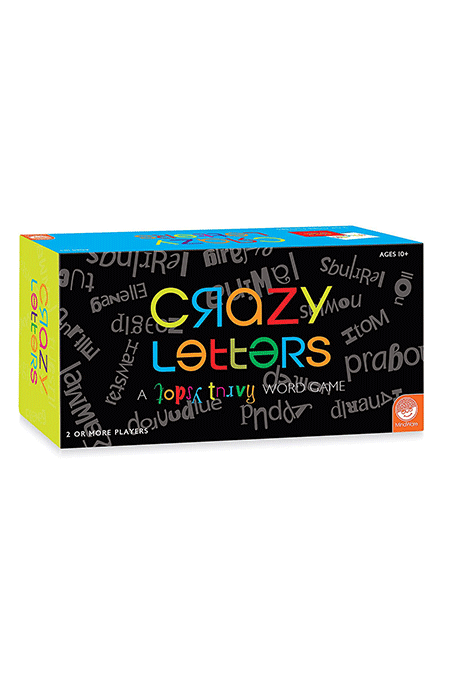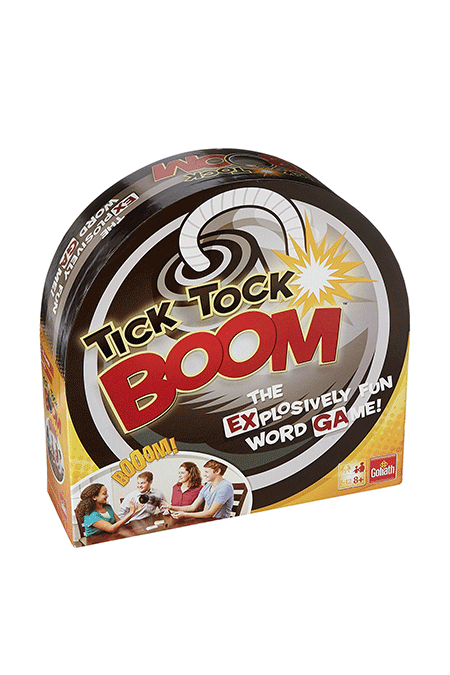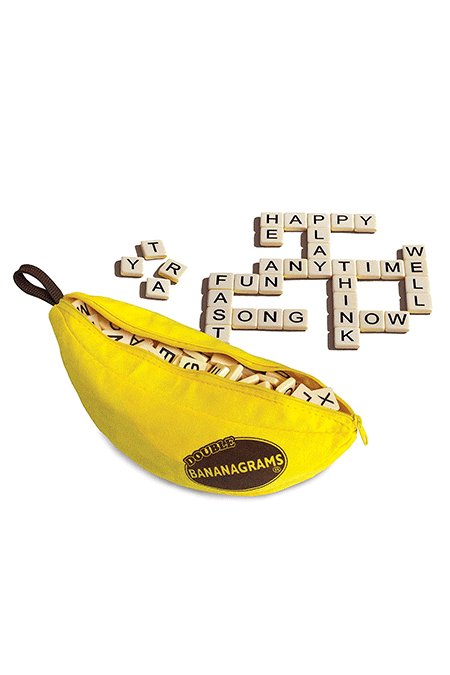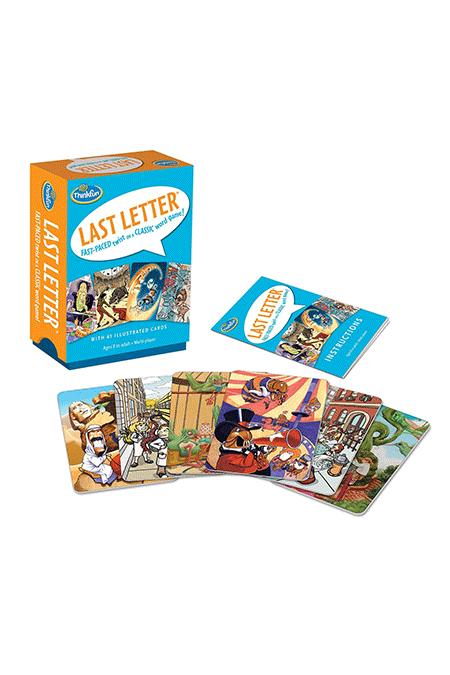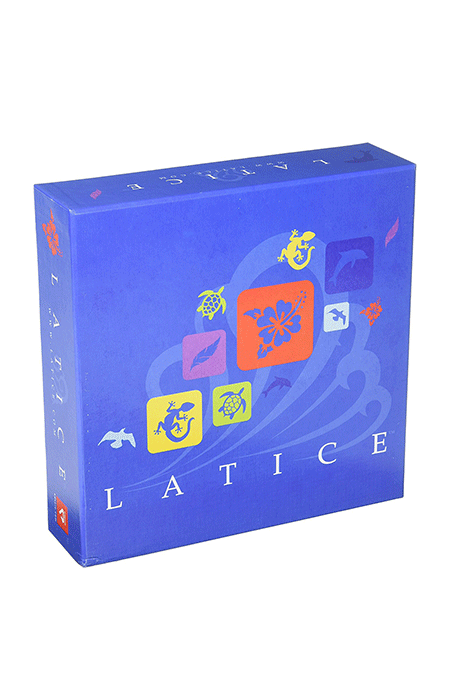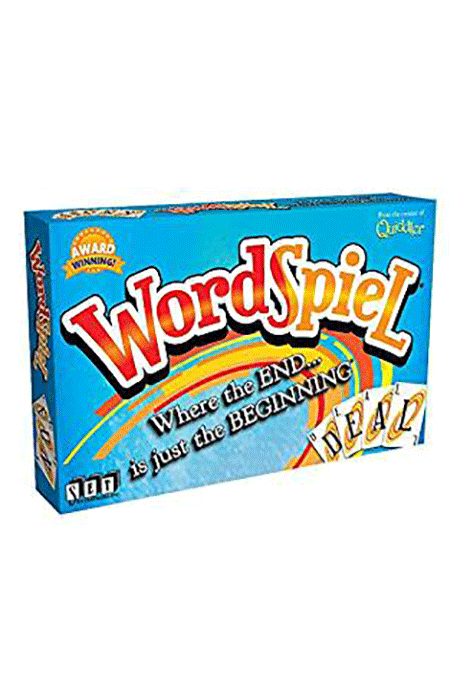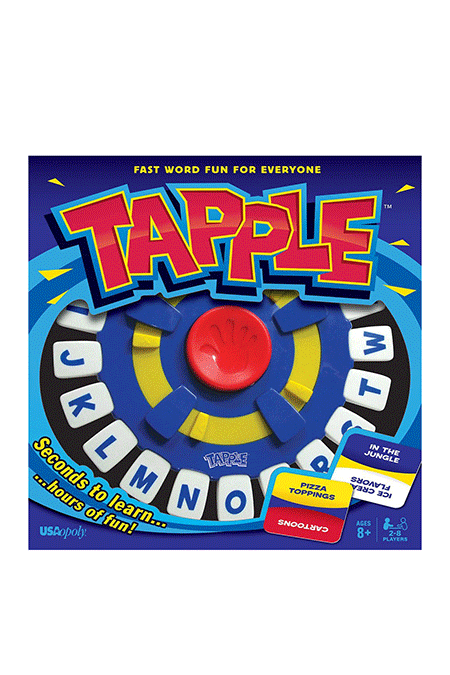These word board games are an excellent way to build up your middle schooler’s vocabulary. They’re educational board games for teenagers.
As teens get ready for high school, it’s important that they have strong language skills, both reading and writing. That means during the middle school years, they should spend time improving their spelling and vocabulary skills.
Instead of relying on a large curriculum or boring worksheets to help your teens further develop their word building skills, play some of these board games instead. They’re a great way to work on language arts.
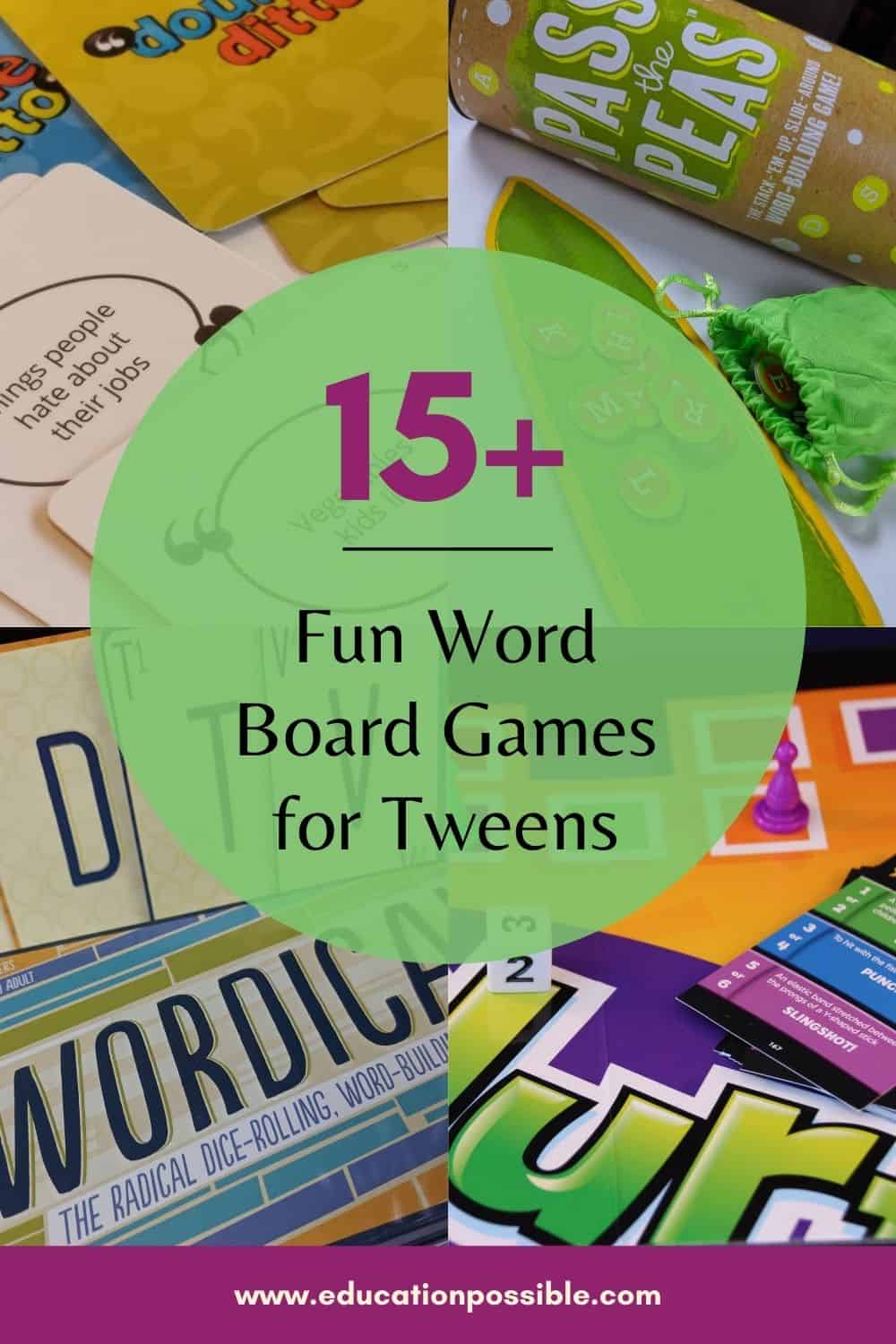
When middle schoolers play these vocabulary word games, they’re not just sitting there answering questions and spouting memorized facts. They’re playing with words and being creative.
Fun language arts games help teens get comfortable with spelling, vocabulary, and building words. All of which improve their reading and writing skills.
Personally, I think the days of giving kids long lists of words to memorize for spelling and vocabulary are long gone.
Tweens learn better when they’re immersed in a subject instead of just retaining facts.
One way to engage your homeschooler in language is to play games specifically designed for word building. As they play, they’ll be shoring up their spelling skills, building their vocabulary and improving their reading skills, all while having some fun.
Board games also have an element of friendly competition built in, so your older kids will be busy trying to beat you and each other, and they’ll probably forget they’re actually learning.
Not only are these word games perfect for language arts class, they’re so enjoyable that they make great additions to your family game night.
The ultimate goal is to raise kids who can communicate effectively, whether written or verbally, so I’m all for using whatever tools work to accomplish this.
These board games and card games are fun to play and excellent tools to add to your language arts plans.
How to Use Board Games in the Classroom
So how can you incorporate board games like these into your classroom or homeschool? It’s actually easier than you think!
- Set aside your language arts curriculum for the day (especially any spelling or vocabulary plans) and play a game instead.
- Transform a standard game by using the facts you’re teaching as the clues.
- Play a word game during lunch. It’s simple to pull out one of these games while you’re sitting at the table eating, and it won’t take any time away from your school day.
- When kids finish their work early or after you give a test, use a word game as a reward.
- If you usually take a day off during the week or have one where your teen has a lighter course load, take an hour to play a game or two.
- Add these word board games to your next family game night. Everyone can benefit from expanding and strengthening their vocabulary. Plus, tweens will love trying to beat you in a word game.
Use games with small groups, individual play, or as a fun activity for the family.
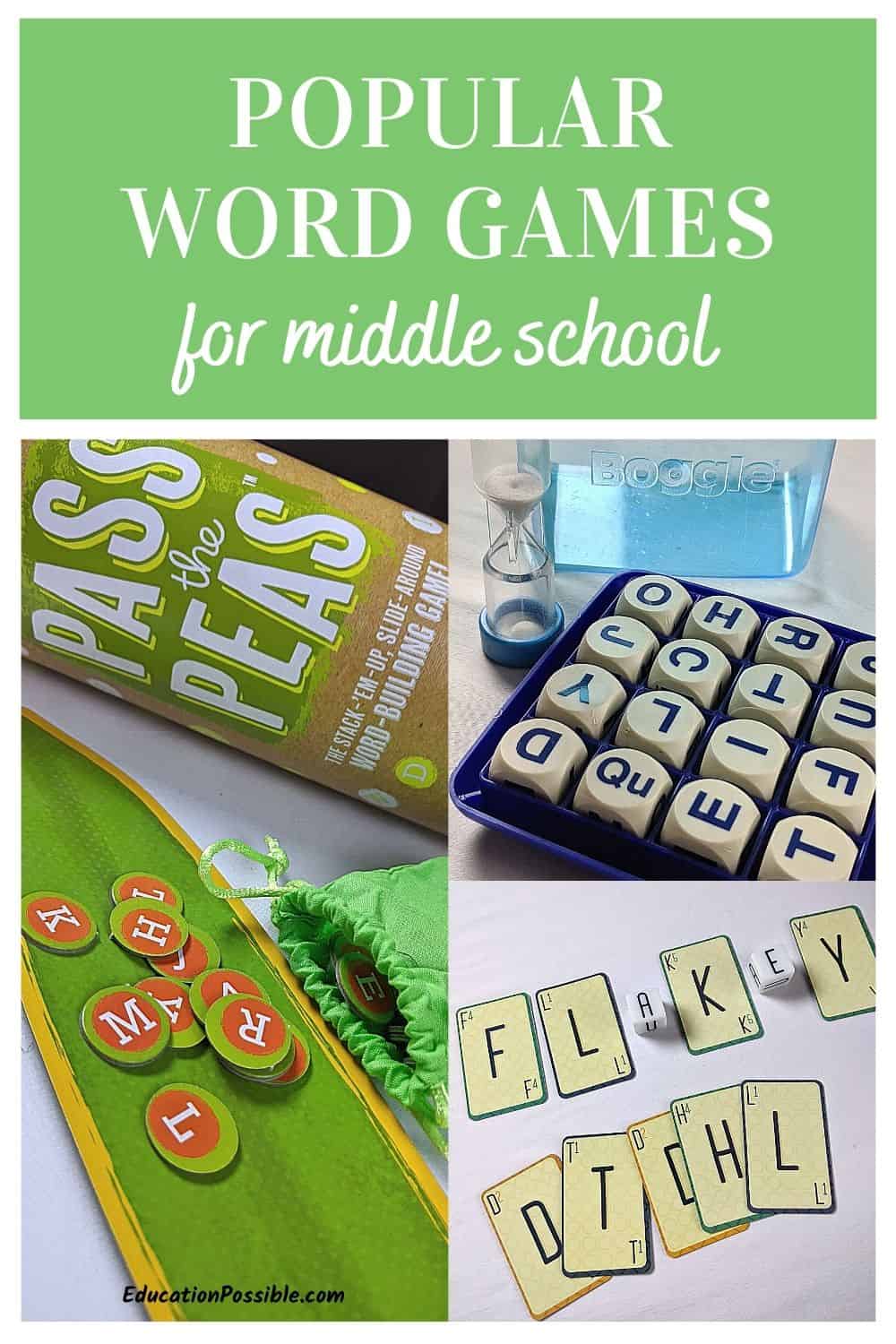
Any links in this post may be affiliate links. See my disclosure statement.
MORE LANGUAGE ARTS ACTIVITIES
Aside from word games, there are plenty of fun activities you can use to build the vocabulary of older children.
- Improve creative writing skills with Story Builders.
- Printable word games.
- Teach writing to teens with dysgraphia.
- These word tools will build confidence.
This is one of our favorite word games. Players race to write down two words that fit the category on the card, and if they match another player’s answer, they both earn points.
It’s an awesome family game.
You play this game with two stacks of cards — category cards and letter cards.
The top card on the category pile is turned over first. As soon as a letter card is flipped, players rush to be the first person to shout out something that fits the category and starts with the letter.
Players race to be the first one to find the word that hides in the letter spiral.
Sounds easy, but it can be quite challenging to find where the word begins and ends when you’re scrambling to beat your opponent.
Scattergories is a classic game that helps build vocabulary words.
Players start the round with a category list. Once the letter die is tossed, they must rush to write as many words as they can that fit the category and start with the chosen letter.
You need to be quick to finish before the time limit. But only unique answers count, so you’ll have to use your vocabulary to win.
As players move around the board, they try to guess the correct vocabulary word from the definition card.
If they give the wrong word, the other players have time to answer.
This game puts a unique twist on the classic crossword puzzle game.
Players try to score the most points by creating words, but they have the added choice of adding their letters on top of other ones.
The higher the pile, the more points players earn.
This game is played with 8 stacks of cards in the middle. When it’s your turn, you choose any of the top cards and create a word. The next player does the same, but then can use the remaining letters to play on your word.
Play continues until you use all the cards.
This is another game that’s played with category cards and letter cards.
However, with this game, when the cards are turned over, players try to be the last one to shout out a word that starts with the letter and matches the category.
The timer is random, so you never know when the time will end.
Players spin the spinner to determine the two letters and category for each round. Then, players race to write as many words as possible that start with one letter and contain the other and also fit the category.
Scrabble is a classic word game that’s still an excellent tool for building everyone’s spelling and vocabulary skills.
Players use their chosen tiles to make words, while trying to get the highest score possible.
This is a fun game to play and is incredibly portable, thanks to the handy banana pouch.
There are lots of variations on the gameplay of Bananagrams, so you’ll never get bored playing. In the classic play, players use their tiles to make words in a crossword-style form.
Boggle is a fun sight word game that’s been around for years.
Players put the lid on and shake the letter dice. Once they settle, start the timer and try to find as many simple words in the letters as you can.
Write them down on a piece of paper before time runs out.
Players are given 20 tiles, and a 5 tiered holder to begin.
When someone says go, everyone races to build 5 different words with their tiles and place them in the slots on the plastic holder.
As soon as someone builds their words, they shout, Dabble, and the round ends.
This vocabulary game includes 108 consonant cards and 2 vowel dice.
Players roll the vowel dice and use them with the consonant cards in their hand to build the highest scoring word.
This is a cute game that will definitely challenge tweens.
You give all players a paper pod and colored letters. When the timer begins, they use their letters to build a word on the pod. Then, they give the pod to the next player and the next round begins.
Now players use the word in front of them and their remaining letters to build a new word.
When your pod gets back around to you, you count the number of letters in your color and that’s your score for the round.
This game will definitely get your tween’s creative juices flowing.
There are 9 dice with pictures on each side. To begin, a player rolls the dice and tells a story, trying to include as many of the pictures as possible.
This is a great game to take along to parties or on a family trip.
There are a bunch of other dice/picture variations you can choose from too.
Here’s how we use Story Cubes in our homeschool.
Hopefully, you’ve seen how easy it is to help your teens build their language arts skills through games. Plus, they’re a lot of fun for middle school students!
Remember that your vocabulary is like a muscle. The more you use it and work it, the stronger it gets. And word board games are a good way to get older kids excited about English language arts.
Don’t let tweens just sit there answering questions and spouting memorized facts. Take some time to play these word games in your homeschool and watch how quickly everyone’s language improves.
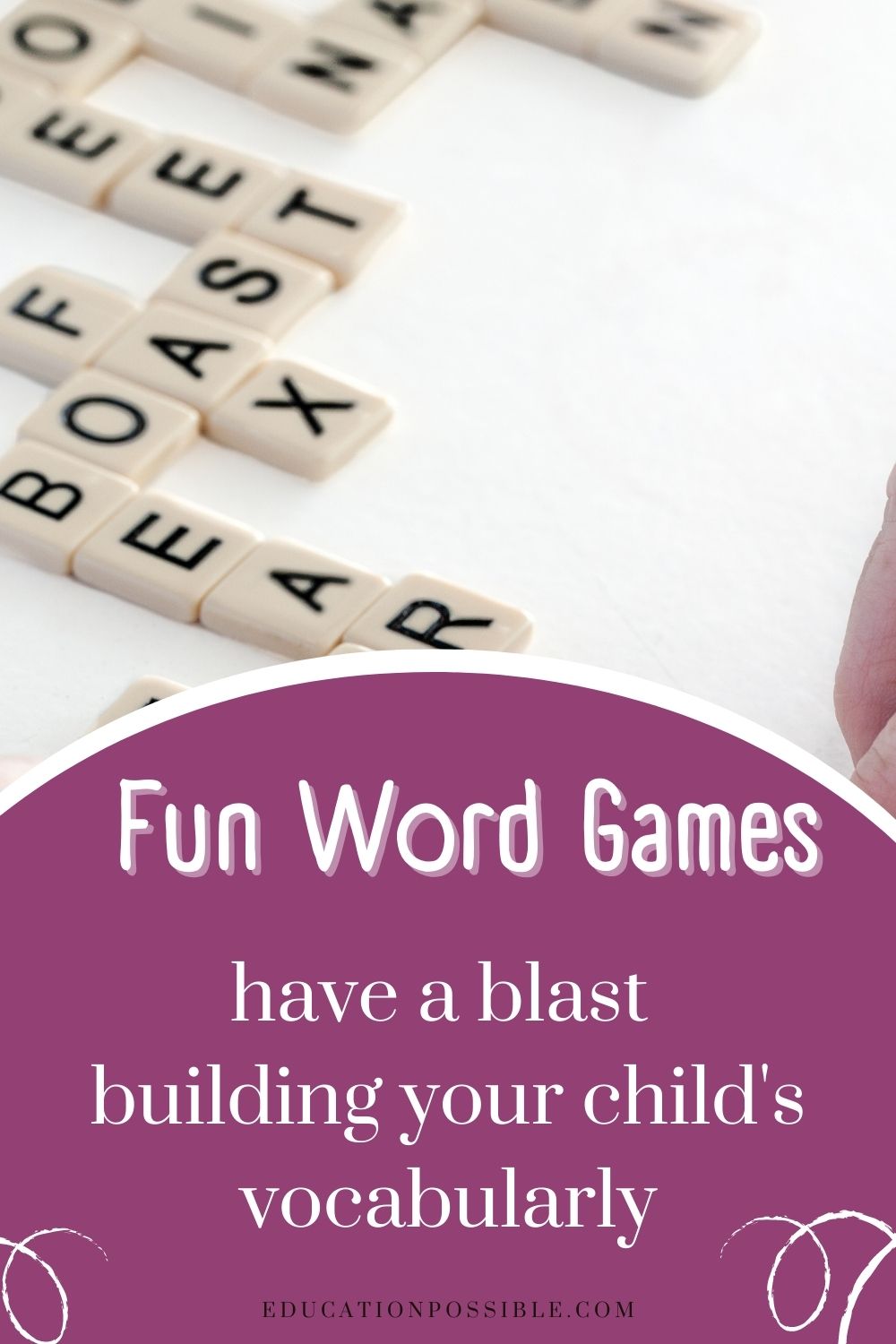
WHAT’S YOUR FAVORITE WORD Board GAME?
- Bio
- Latest Posts
I love homeschooling! Learning is a way of life for our family. Most days you will find us exploring our Central Florida community, having fun while learning. I am constantly looking for new and interactive ways to engage my older children.
You found our list of fun and simple vocabulary games for adults.
Vocabulary games are activities that include language and wordplay. Example games include Word Association and Hang Man. Players can enjoy vocabulary games in person or online. The purpose of these games is to strengthen vocabulary skills. These games are also known as “vocab games”, “letter games” and “vocabulary building games.”
These games make great online classroom activities and communication games, and can be used as online fun activities for employees.
This list includes:
- vocabulary games for adults
- simple vocabulary word games for adults
- fun online vocabulary games and activities
- English vocabulary games
- vocabulary games in English
- games to improve vocabulary
- vocabulary building activities
- vocab review games
- vocabulary games for students
Get ready to play!
List of vocabulary games
From Pictionary to word scrambles to synonym memory, here is a list of fun word games to play in classrooms, at parties, or during meetings.
1. Vocabulary Pictionary
Pictionary is a game of charades where players draw words instead of acting them out.
To play:
- Split the group into teams.
- Each round, assign one team member to draw.
- Give the drawing team member a word.
- Allow up to sixty seconds for teammates to guess.
- If the team guesses correctly, then assign one point.
You can give other teams the opportunity to steal, or move onto the next team’s turn. The game is a great way to practice new vocabulary, as players connect the word with an image. Pictionary is a fun game for virtual parties or in-person affairs.
To play Pictionary online, draw on the whiteboard app feature on your online meeting software.
2. Word Association
Word Association is one of the best vocabulary games for kids and classrooms since playing does not require a large vocabulary. The rules are simple and easy to understand. Typically, the game involves two players.
To play:
- Player one says a word.
- Player two responds with the first word that comes to mind.
- Player one either chooses a new word or responds to player two’s word.
- The game continues until one player repeats a word or pauses too long.
The rapid pace of the game generates excitement and occasionally results in funny answers.
If a student makes a mistake, then the teacher can pause the game and ask the student to explain or find a more fitting word. Ideally, gamemasters should allow players a few extra seconds to respond. Players should never feel embarrassed. There are no wrong answers in word association, but the game can serve as a learning opportunity to find better words.
If playing via Zoom, then player one or the teacher speaks a word, and other students answer in the chat. The class counts up matching answers and discusses different responses, guessing the reasoning behind each answer.
3. Vocabulary Hangman
Hangman is a classic chalkboard word game that translates easily to online play, thanks to digital whiteboards.
To play:
- Assign a player a word.
- The player draws a series of blanks corresponding to the number of letters in the word.
- Other players guess letters.
- If the letter is in the word, then the “executioner” fills in the blank. If not, then the executioner draws one portion of the gallows.
- The game ends when players guess the word, or when the picture is complete.
The best words to use for hangman contain less-used letters like z, x, and q. Examples of hard hangman words include zigzagging, razzmatazz, and quadrants.
4. Word search
Word searches are common classroom vocabulary games. These activities work well for handouts, and you can play during video calls by using the whiteboard feature and enabling annotation.
We made a sample word search you can use.
To make the game more competitive and exciting, turn the challenge into a race and award prizes to the first players to complete the puzzles.
5. Crossword
Crossword puzzles consist of a series of interconnecting boxes, each of which starts blank but contains one letter by the end of the game. Under the puzzle are two lists of clues, across and down respectively. Solvers need to consider the meaning of words, number of letters, and surrounding words, making the game strategic as well as literary.
Here is an example of a crossword puzzle you can use with your class or team.
Here is the answer key.
Crosswords are great word games for any age or skill level because puzzle makers can adjust the difficulty to suit players. To make your own crossword puzzle, use an online crossword creator.
6. Word Scramble
Word scrambles make great games for English class, and adults enjoy these language brain teasers as well. Simply mix up the order of the letters and ask players to unscramble and identify the original words.
Here is a sample to start with.
And here is the answer key.
To make your own word scrambles, use an online letter randomizer.
7. Scrabble
Scrabble is one of the most popular word games for adults or children. Players must use letter tiles to assemble words on the game board.
To play:
- Each player draws seven letter tiles.
- During turns, players can play tiles or exchange them for new letters.
- Players build words on the board, with each new word connecting to an existing word.
- Tiles have a point value assigned depending on the challenge of the letter. When a player makes a word, tally the letter and add the score to the point board.
More challenging letters have higher point values. For example, E is one point, while Z is ten. To find the point values for each tile and read more gameplay tips, check out this guide from Hasbro.
To coordinate the game for language lessons, assign higher scores for vocabulary words, and ask players to use the words in a sentence for extra points.
Scrabble is easy to play online, too, making it one of the best online vocabulary games. To play virtually, simply find a multiplayer online version of the game, such as Words With Friends.
8. Scattergories
Scattergories is one of the most fun and simple word games for adults. The game challenges players to think up words all starting with the same letter.
To play:
- One player rolls a letter die or uses a letter generator to pick the first letter.
- The timekeeper puts 60 seconds on the clock.
- Players write down one answer per category starting with the letter.
- When time runs out, players read the answers.
- Players receive a point for every answer.
Alliterative phrases count for double or triple points. If two players have the same answer, then they must cross it out and neither receives points. Of course, a player will not receive points for blank answers either. At the end of each round, the player with the most points wins.
Here is a list of sample Scattergories categories:
- A boy’s name, girl’s name, or gender neutral name
- Capital cities
- Four letter words
- Types of drinks
- Holidays
- Careers or professions
- Cartoon characters
- Websites
- Desserts
You could create more inventive categories for the game, or challenge players to make up prompts.
To play virtually, use the chat, screen-share, whiteboard functions in your virtual meeting platform. You can also share a Google Doc or Form, or join a multiplayer online Scattergories game together.
9. Tree or Bob Ross
Tree or Bob Ross is a fun video conference game that challenges players to guess a word by asking questions.
The player who conjures the word is The Post. The Post answers This or That questions whose answers help players narrow down the word.
The first question of the game is usually “is it more like a tree, or more like Bob Ross?” and The Post must answer accordingly. For instance, a rose is probably more like a tree, but Pinnochio presents an interesting challenge.
Each turn, the guesser adds a new word. For example, the second question might be, “is it more like a tree or a fern?” The game continues until players guess correctly. For more excitement, introduce a time limit, or award more points if players guess the word during earlier rounds.
10. Vocabulary Pyramid
Pyramid challenges players to guess words from context clues. The pyramid is a collection of six words, arranged with three on the bottom, two in the middle, and one at the top. To win, teams must guess all words within the pyramid in the allotted time.
To play:
- Divide the group into teams.
- Give one player on each team the pyramid.
- The pyramid holder must give hints to teammates describing each word without using the actual name of the item.
- When players guess correctly, the pyramid master can move to the next word. Or, players can say “pass,” and return to the word later.
- Teams receive a point for every correct guess.
When determining the time limit, consider the age of your players and the difficulty of the words. In general, 30 seconds per word, or three minutes total, is a good place to start, but add or take away time to increase or decrease the challenge.
11. Invisible Bridge
Invisible Bridge is similar to six degrees of Kevin Bacon. In both games, you must figure out a way to connect two seemingly distant concepts. Six degrees of Kevin Bacon uses actors, while Invisible Bridge uses words.
To play:
- A player suggests two unrelated words.
- Player one gives a number of planks. This is how many steps other players must use to relate the two words.
- The other players think up words that share similar traits, synonyms, or connector words to move from one term to another.
An example round might look as follows:
Tiger, Astronaut, eight planks
Tiger – Balm – Lip – Service – Customer – Happy – Pills – Capsules – Space – Astronaut
Meanwhile, Tiger, Astronaut, two planks might look like this:
Tiger – meat eater – meteor – Astronaut
One fun aspect about this game is there can be more than one correct answer, and opposing teams can dispute far-reaches. Invisible bridge encourages players to think about the nature of language and the relationship between words.
12. Poetry Improv
Poetry Improv is an exercise that challenges participants to craft verses on the spot.
To play:
- Pick a poetry style, such as sonnet, haiku, acrostic, limerick, or free verse.
- Give participants vocabulary words to use within the poem.
- Allow five or ten minutes for groups or individuals to complete the verses. If playing online via meeting software, then send groups to breakout rooms to work.
- Ask poets to share the masterpieces aloud.
For extra fun, turn other players into judges by asking them to rate the poems by holding up scorecards. To make the game more fast-paced, ask players to finish each others’ phrases on the spot for a true poetic improv.
13. Synonym Memory
The rules of Memory are easy: flip over two cards at a time and look for matching pictures or words. When players find pairs, they take the cards off the board. The player with the most pairs of cards at the end of the game wins.
Synonym Memory puts a challenging spin on the simple game. Instead of hunting for exact matches, players pair up words with synonyms.
Here are some sample matches:
- enticing/tempting
- assume/suppose
- patience/restraint
- revoke/rescind
- impact/collision
The game encourages players to think in different ways, as participants will need to remember the location of the cards as well as consider meanings of words.
To play online, make your own virtual synonym memory game with an online tool and share screens to play, with one player flipping over the cards at other players’ request.
List of words to use for vocabulary games
Here is a list of great words to use in word games:
- serendipity
- fortitude
- akimbo
- sumptuous
- ineffable
- zephyr
- incorrigible
- medallion
- mauve
- bombast
- denouement
- contemporary
- gossamer
- inane
- hippodrome
- concession
- ideology
- quintessential
- prescient
- regurgitate
- gnash
- cataclysmic
- knell
For further inspiration, use a random word generator or consult online lists of difficult or intersecting words.
Conclusion
Vocabulary games and activities test and strengthen players’ communication skills. These word games minimize frustration by disguising language lessons in the form of an exciting challenge. Not to mention, simple word games are fun for adults and kids alike, and make great icebreaker activities during meetings. Most games only require words and a way to share them, so playing word games online via Zoom or similar platforms is easy.
For even more smart fun, check out our posts on problem solving games, question games and team building brain teasers.
FAQ: Vocabulary Games
Here are answers to common questions about vocabulary games and activities.
What are vocabulary games?
Vocabulary games are word and language games you can play with students, coworkers, or family and friends. These games challenge players to hunt for words or definitions, brainstorm terms, deduce phrases based on clues, or create words under certain conditions. Language games are a great way to teach new vocabulary and help students practice recognizing and using new words. These activities are also known as “vocabulary building games” and “vocab games”, and are similar to “word games” and “letter games”.
What are some fun word games for groups?
Some fun word games for groups include Pictionary, Tree or Bob Ross, and word scrambles.
What are some online vocabulary games?
By using virtual meeting software like Zoom, you can play any word game online. Some good virtual vocabulary games include Scrabble, Scattergories, and online crossword puzzles.
What are good ESL word games?
The best ESL word games are easy to understand and play yet expand the vocabularies of participants. Good ESL word games include word association, word searches, and hangman.
What are fun ways to teach vocabulary?
Word games are one of the most fun and easy ways to teach vocabulary. While some kids get frustrated with straightforward reading or language exercises, word games disguise vocabulary lessons as a fun challenge. Plus, playing language games together is a great teamwork exercise.
We know if it were up to you, Scrabble would be the only game played during family game night. But if the crew is asking for new suggestions, consider these word games. They offer everything you love about the classic crossword game, but with a few added twists.
Advertisement — Continue Reading Below
1
Take a Letter
Think of Take a Letter as Monopoly meets Scrabble. Players move around the board collecting and trading to get the letters they need to form a word. You’re awarded points based on the length, verb tenses, and letters used.
BUY NOW: $15, amazon.com
2
Typo
This card game focuses on the power of using just one letter to expand on a word already on the board. If a player can’t, he has to take the longest row of cards already played into his hands. The first one to put down all their cards, wins!
BUY NOW: $40, amazon.com
Advertisement — Continue Reading Below
3
Dabble
Players start with 20 tiles and the timer set to five minutes. The first player to create a two, three, four, five, and six letter word using shouts out «DABBLE!» to win the round.
BUY NOW: $22, amazon.com
4
Juego de Palabras
Players have two-minutes to piece together as many palabras (words) as they can using color-coded letter rods.
BUY NOW: $29, amazon.com
Advertisement — Continue Reading Below
5
Pass the Pen
If your biggest turn off in Scrabble is waiting for your turn, try Pass the Pen. Each player starts to draw the clue, but a built-in timer causes the pen to retract. Once it disappears, you pass the pen and let the next player continue drawling. Whoever is drawling when the clue is guessed wins the points!
BUY NOW: $16, amazon.com
6
Set
Take a break from creating words and create patterns instead. Players keep tabs on their cards throughout the game and match similar cards together to make sets of three. The goal is to have the most sets when the timer runs out.
BUY NOW: $12, amazon.com
Advertisement — Continue Reading Below
8
Quiddler
Quiddler challenges players to create longer words on their turn to get rid of as many cards as possible. The dealer delves out more and more cards as the rounds go on. The longer you wait to play, the more you’re stuck with at the end.
BUY NOW: $9, amazon.com
Advertisement — Continue Reading Below
10
Big Boggle
You start by shaking up the letters in this portable game, so every round is different. Once the cubes settle, set the timer and see who can find the most four letter words in the scramble.
BU NOW: $18, amazon.com
Advertisement — Continue Reading Below
11
Crazy Letters
This mind game forces contestants to second guess what they’re reading. The first one to decipher the word on the card wins the round. Because the rules are so simple, last-minute players are always welcome!
BUY NOW: $25, amazon.com
12
Tick-Tock Boom
The goal of the game: Don’t get caught holding the bomb. While the explosive is in hand, players draw a card with three letters and have to think of a word that contains them. Only then, they can pass the bomb and breathe a sigh of relief.
BUY NOW: $19, amazon.com
Advertisement — Continue Reading Below
13
Bananagram
It’s a classic, but we have to include Bananagrams for being a version of Scrabble you can literally play ANYWHERE.
BUY NOW: $20, amazon.com
Advertisement — Continue Reading Below
16
Last Letter
This game is sure to bring the giggles thanks to the quick pace that challenges people to blurt out the first word that comes to mind. An added challenge: It has to start with the last letter of the previous word said.
BUY NOW: $13, amazon.com
Advertisement — Continue Reading Below
18
Latice
In Latice, the more matches you have on the board, the more turns you get. Play all your tiles before everyone else and you’re the champion!
BUY NOW: $20, amazon.com
Advertisement — Continue Reading Below
19
WordSpiel Card Game
The length of your word doesn’t matter as much here, but the person after you has to start their word with the last letter of the word you played, so try to make it tricky!
BUY NOW: $13, amazon.com
20
Tapple
Quick thinkers are the kings of Tapple. Choose a category card and answer with a word that starts with the letters on the board in 10 seconds or less. Each can only be used once, so rounds get harder and harder as you go.
BUY NOW: $25, amazon.com


















